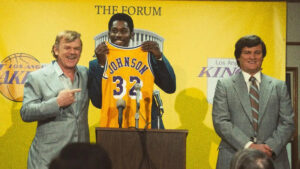Winning Time is an HBO series telling the story of the rise of the Los Angeles Lakers in the 1980s. The actors in the show break the Fourth Wall with great frequency and that is the focus of my blog today.
The show is about Dr. Jerry Buss who purchased the Lakers in 1979 and his attempt to build a championship team around young Earvin ‘Magic’ Johnson, Jr. I’ll break any suspense by telling you I think it’s a pretty good show … at times. Then the actors break the fourth wall and it’s not so good.
What is the Fourth Wall?
The Fourth Wall is line between the stage and the audience. The actors are actors and the audience is the audience. An actor generally pretends she or he does not know the audience is out there watching. He or she performs. This means pretending to be the character in question rather than an actor portraying that character.
The purpose of the Fourth Wall is to immerse the audience in the performance. It is generally important for us to believe the person on the screen is Dr. Jerry Buss, not John C. Reilly an actor pretending to be Buss.
Why Ignore the Fourth Wall?
There are reasons to ignore the Fourth Wall and the character Deadpool from comic and movie fame is a perfect illustration. Deadpool understands he is a character and we are watching him. His jokes revolve around the idea of this self-awareness.
There is, in my opinion, no reason to do this in Winning Time.
Why Breaking the Fourth Wall hurts the Show
The show, when the actors are acting instead of mugging for the audience is quite good. The only time Reilly isn’t excellent in the role of Buss is when he’s talking to us. Rob Morgan is absolutely slaying it as Earvin Johnson, Sr. I believe every second of his performance as a caring, loving father and, not surprisingly, none of his scenes break the wall.
DeVaugn Nixon is excellent as Norm Nixon, worried about the young Johnson coming in and taking his job. Michael O’Keefe is superb as Jack Kent Cooke. Jason Clarke’s rage as Jerry West, whether accurate or not, comes across with red-hot intensity.
Largely, the only time the show doesn’t work is when the actors break the Fourth Wall. Doing this has two negative effects. First it immediately takes me away from immersion. I realize I’m watching actors and not actual events and people.
Second it is being used as exposition, to tell us something rather than showing it. A glaring example is when actor Gaby Hoffman turns to the camera and tells us she needs this job and then lets down her hair right before meeting with Buss. Why not just let down her hair? That tells us everything we need to know. I don’t want to watch Gaby Hoffman, I want to see Claire Rothman, a woman in a sea of misogyny, doing her job.
Black Culture
Getting away from the fourth wall for a moment I want to praise what appears me as a fair portrayal of black, urban culture. The family scenes with the Johnsons and the pedicure scene with Nixon rang very true to my eyes. The writers didn’t overplay these interactions to the point of parody nor did they hide the cultural norms of the community. They seemed true.
Now, I’m a white boy from the suburbs so I’m certainly not particularly well-qualified to make that judgement. I can say with utter honesty, the scenes convinced me, I was immersed.
Conclusion
It’s a good show but I wish they’d decided against going with a Fourth Wall breaking formula. The story of Buss, Johnson, and the others is fascinating on its own. That, of course, was not my decision to make and it’s not going to change.
I’ll be tuned in next week.
Tom Liberman

Pingback: Introducing New Characters Gilded Age and Winning Time - Tom Liberman
Pingback: A Cartoon Interlude that Nearly Spoiled Winning Time - Tom Liberman